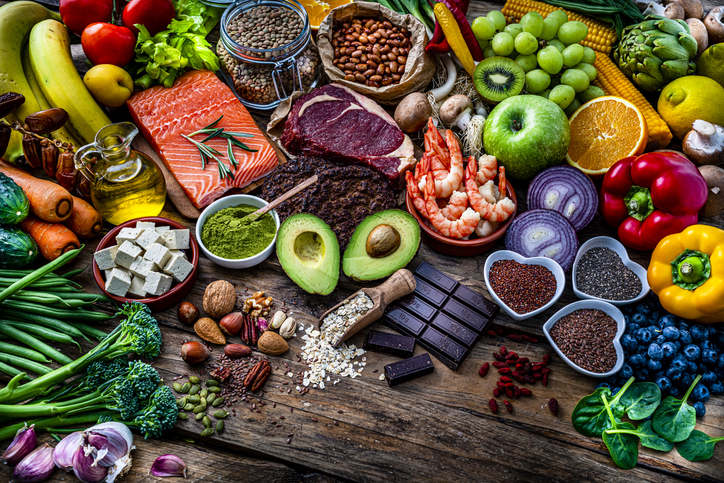The Longevity Diet May Change The Way You Think About Protein And How You Eat In General

By Joy Stephenson-Laws, J.D., Founder
A 54-year-old neurologist by the name of Valter Longo said that he plans to live to 120 by following what he calls the longevity diet. Normally, I would gloss over such claims, however, check out this man’s accolades! Dr. Vongo is also author of the The Longevity Diet (a book published in 2016).
Here are the fundamentals of the longevity diet:
- Lots of vegetables (leafy greens are important) and fruits
- Nuts
- Beans
- Olive oil
- Seafood that is low in mercury (in moderation)
- It is NOT encouraged to eat a lot of meat and dairy and, of course, processed foods that are high in sugar and saturated fats are not part of the longevity diet
- If you are going to drink milk, goat or sheep’s milk is recommended over cow’s milk
- Recommends consuming fermented dairy in moderation (such as cheese and yogurt) for gut microbiome benefits

It is health that is real wealth and not pieces of gold and silver." - Gandhi

“In the longevity diet it is recommended most of the protein comes from plant sources or fish. This may require special planning to ensure a complete range of all the nutrients needed if the diet is missing red meat,” according to this Medical Xpress report.
To be clear, this diet is very plant-forward. “Eat mostly vegan, plus a little fish, limiting meals with fish to a maximum of two or three per week. Choose fish, crustaceans, and mollusks with a high omega-3, omega-6, and vitamin B12 content (salmon, anchovies, sardines, cod, sea bream, trout, clams, shrimp). Pay attention to the quality of the fish, choosing those with low levels of mercury,” Dr. Vongo published on his website.
The longevity diet also recommends practicing intermittent fasting, but in a very approachable manner. Some people may have difficulty following the 16:8 method of intermittent fasting, which means fasting for 16 hours and eating within an 8-hour window. For example, eat only from 10 a.m. to 6 p.m. The longevity diet, however, says that you can fast for only 12 hours and also suggests trying not to eat three to four hours before going to bed. So, for example, your eating window could be 7 a.m. to 7 p.m., and your bedtime might be 10 p.m or 11 p.m. In my opinion, that seems pretty doable if you are new to fasting.
If you are someone that needs to lose weight (as in you are overweight or obese), the longevity diet suggests having just two meals a day (breakfast and either lunch or dinner). Two low-sugar snacks are also allowed, but, as always, consult your doctor or a competent healthcare professional when it comes to making major dietary changes and cutting out full meals.
“While the longevity diet has been targeted to older adults, it is also recommended for younger people,” reports Medical Xpress.
I think this is really important, because so many young peoople are currently suffering from life-shortening illnesses such as obesity, type 2 diabetes and hypertension.
How much protein?Perhaps the most interesting part of the longevity diet is that it actually suggests restricting protein intake. Our bodies require the optimal combination of six groups of nutrients to stay healthy: water, carbohydrates, fats, vitamins, minerals and protein. Protein plays a key role in muscle building and repair. And as we age, we may naturally lose muscle.
High-protein (particularly animal sources of protein) and low-carb diets are usually emphasized because they may aid in weight loss and help you build more muscle. You do need to be mindful of your protein source. For example, a piece of grilled salmon and a portion of salami are both high in protein, but the salmon is much healthier while the salami is processed and full of saturated fat.
According to Harvard Medical School, “The ideal amount of protein you should consume each day is a bit uncertain. Commonly quoted recommendations are 56 grams/day for men, 46 grams/day for women. You could get 46 grams/day of protein in 1 serving of low-fat greek yogurt, a 4 oz. serving of lean chicken breast and a bowl of cereal with skim milk [for example].”
“But some experts suggest that these recommendations are all wrong and that we should be consuming more protein, up to twice the standard recommendations. Still others claim that the average American diet already contains too much protein.”
Mamy Americans (both men and women) eat at least around 100 grams of protein per day.
You are going to find researchers and doctors on both ends of the protein spectrum, but the longevity diet is on the more conservative end. This diet recommends 47 to 56 grams of protein for a person who weighs around 155 pounds. Age is a major factor that must be taken into consideration.
“If you are below the age of 65, keep protein intake low (0.31 to 0.36 grams per pound of body weight). That comes to 40 to 47 grams of proteins per day for a person weighing 130 pounds, and 60 to 70 grams of protein per day for someone weighing 200 to 220 pounds. Over age 65, you should slightly increase protein intake but also increase consumption of fish, eggs, white meat, and products derived from goats and sheep to preserve muscle mass. Consume beans, chickpeas, green peas, and other legumes as your main source of protein,” according to Dr. Vongo’s site.
Sarcopenia, which is age-related muscle loss, makes older people more prone to falls. So it makes sense that someone over the age of 65 would need more protein (the nutrient that plays a key role in muscle growth and repair). I’m not sure if I agree that people should wait until they are 65 or older to increase their protein intake, because muscle loss can start as young as 30.
I do love that Dr. Vongo gives guidelines for people at different stages in their life. Nutrition is never a one-size-fits-all approach, and your diet may need to change depending on your current life circumstances. Check out:
- Longevity diet in pregnancy (always consult your obstetrician)
- Longevity diet while breastfeeding (consult your doctor)
- Longevity diet for children and adolescents (consult your pediatrician)

The food you eat can be either the safest and most powerdul form of medicine or the slowest form of poison." - Ann Wigmore

Overall, I honestly would. I cannot promise that it will grant 120 years on this planet, of course, but I believe a mainly plant-based diet can significantly contribute to longevity. To be clear, it is always good to check with a competent physician to see if this diet is a good fit for you, especially if you have any existing health issues and/or are taking any medications or if you are pregnant and/or breastfeeding. I do, however, love that this diet is very vegetable and fruit forward, eliminates processed foods that offer no nutritional value and encourages healthy fats and healthy sources of protein. The longevity diet is very nutrient-rich, and nutrients (particularly essential micronutrients which are vitamins and minerals) help prevent disease and therefore increase our chance of having a long, healthy life.
It is also important to acknowledge that regular exercise, quality sleep and stress management are key for a long, healthy life. We must also take note that drinking alcohol, which is a neurotoxin and crosses the blood brain barrier, is not good for promoting longevity. I know many diets have encouraged drinking red wine in moderation for heart health, but notice that the longevity diet doesn’t even mention alcohol. Recently, the American Cancer Society changed their guidelines to drinking little to no alcohol at all.
Also make sure to take routine nutrient tests in order to identify any nutrient imbalances or deficiencies that you may have. Truth is, most of us do. If a deficiency or imbalance is found, a competent healthcare professional can work with you regarding making the necessary dietary changes and recommend quality supplements if necessary.
"I'd rather be fat and happy."We’ve all heard people say this. It’s hard to face the harsh facts that the diet we may be consuming may contribute to disease, premature aging and a shorter life. Some people say life is not worth living if you can’t enjoy the foods you love. I would argue that you can actually love healthy foods and even prefer them if you take the time and effort to explore in the kitchen as well as find healthier alternatives to some of your favorite junk foods. You also do not have to be perfect. I am not here to tell people that they can never eat a piece of cake again or have a donut every once in a while. It’s just about practicing moderation and following a healthy lifestyle on a consistent basis. Put an emphasis on life quality and not just longevity. A quality life is a healthy life.
For some inspo, click here for some healthy recipes.
Enjoy your healthy life!
The pH professional health care team includes recognized experts from a variety of health care and related disciplines, including physicians, attorneys, nutritionists, nurses, and certified fitness instructors. This team also includes the members of the pH Medical Advisory Board, which constantly monitors all pH programs, products, and services. To learn more about the pH Medical Advisory Board, click here.







